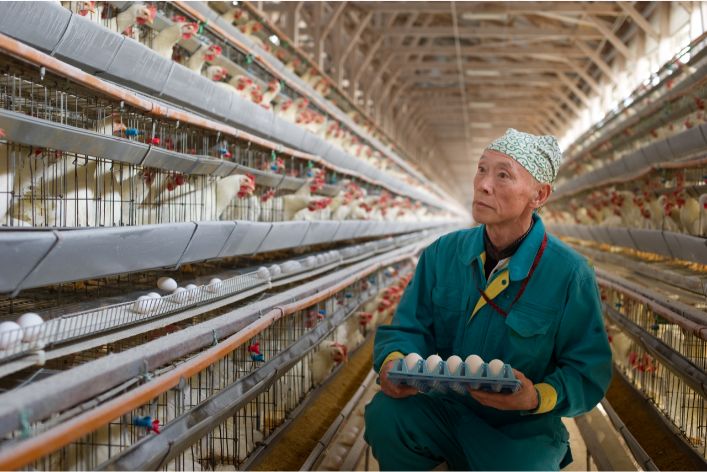Introduction
Agribusiness in Nigeria has become a viable career choice due to the growing demand for agriculture products across the globe.
With a population of over 200 million people and a rapidly expanding food industry, the agribusiness sector in Nigeria is on the brink of significant growth.
Nigeria’s economy is hugely dependent on oil exports, which has resulted in the neglect of the agriculture sector, but there has been a shift in focus recently.
Nigeria is gradually transitioning to a diversified economy, with the National Bureau of Statistics reporting that agriculture contributed about 24% to Nigeria’s GDP in 2020, up from 23% in 2019.
There are significant employment opportunities within this sector across various value chains, including production, processing, marketing, and distribution.
This has consequently drawn the attention of investors, local and international, to Nigeria’s agriculture sector.
The benefits of agribusiness are immense, ranging from addressing the food security challenge in Nigeria to earning foreign exchange through exports.
This sector has the potential to not only provide long-term, sustainable economic growth but also contributes to poverty reduction, especially in rural areas.
Investing in agribusiness presents an opportunity for young and budding entrepreneurs to contribute to the growth and development of Nigeria’s economy while satisfying their passion for agriculture.
In essence, the agribusiness sector in Nigeria is showing promising signs of growth, with several opportunities available for young and skilled professionals to invest their time and expertise.
As the government continues to provide support and invest in this sector, Nigeria’s agriculture industry will see substantial improvements, paving the way for long-term, sustainable economic growth.
Read: Exploring Top 10 Lucrative Agriculture Professions in Nigeria
Types of Agribusiness Roles in Nigeria
There are a variety of roles available in the agribusiness industry in Nigeria. These roles include:
Agricultural Engineer
An agricultural engineer is responsible for designing and developing equipment and tools used in agriculture. They also assist with the planning and implementation of agricultural projects.
To become an agricultural engineer in Nigeria, one must have a degree in agricultural engineering or a related field.
Agronomist
An agronomist is responsible for studying plants and soil in order to improve crop yields. They work closely with farmers to develop farming techniques to increase productivity and efficiency.
To become an agronomist in Nigeria, one must have a degree in agronomy, soil science or a related field. A master’s degree is often required for more advanced positions.
Agricultural Economist
An agricultural economist is responsible for analyzing economic data related to agriculture and determining the most profitable ways to grow and sell crops. They also develop marketing strategies for agricultural products.
To become an agricultural economist in Nigeria, one must have a degree in agricultural economics or a related field. A master’s or doctorate degree is often required for advanced positions.
Agricultural Extension Agent
An agricultural extension agent works directly with farmers, providing education and training on the latest farming techniques and technologies. They also assist farmers with accessing financial resources and government programs.
To become an agricultural extension agent in Nigeria, one must have a degree in agriculture, agricultural extension, or a related field. Certification may also be required.
Marketing and Sales Specialist
A marketing and sales specialist is responsible for developing and executing marketing and sales strategies for agricultural products. They work closely with farmers to promote their products and increase sales.
To become a marketing and sales specialist in Nigeria, one must have a degree in marketing, sales, or a related field. Experience in the agricultural industry is often preferred.
Agricultural Scientist
An agricultural scientist conducts research on plants, animals and soil in order to improve agricultural practices. They also develop new and innovative technologies for the agricultural industry.
To become an agricultural scientist in Nigeria, one must have a degree in agriculture, plant science, animal science or a related field. A master’s or doctorate degree is often required for advanced positions.
Overall, the agribusiness industry in Nigeria offers a range of exciting and rewarding career opportunities. Whether one is interested in working directly with farmers, conducting research and development, or developing marketing strategies, there is something for everyone in this dynamic and growing industry.
Read: Midwifery in Nigeria: The Heroes of Maternal Health
Advantages of Pursuing a Career in Agribusiness
- Job Security: Agribusiness is a crucial sector in Nigeria, making it a secure career path.
- Diverse Career Opportunities: The sector offers various career choices, ranging from farming to research and development.
- Entrepreneurial Opportunities: The agribusiness industry provides opportunities for entrepreneurs to start their businesses.
- Lucrative Career Choice: Agribusiness is a profitable career path, as there is always a high demand for food and agricultural products.
- Job Satisfaction: A career in agribusiness provides individuals with the satisfaction of contributing to food security and the well-being of the nation.
Agribusiness in Nigeria offers lucrative career prospects due to several reasons. The sector ensures job security as food is a basic need, creating a consistent demand for skilled professionals in agriculture.
As the world population grows, the demand for food production increases, resulting in abundant opportunities in the industry.
The agribusiness sector has diversified, offering career paths in production/processing, marketing, research and development, policy formulation, and regulation.
Entrepreneurs find ample opportunities in agriculture-based businesses such as processing, packaging, marketing, and distribution, contributing to Nigeria’s economic growth.
Working in agribusiness provides a decent income, with stable or increasing levels due to the high demand for food.
Government programs and policies support the sector, offering financing and incentives for farmers, enhancing profitability.
Agricultural professionals contribute to food security, playing a crucial role in the growth and development of the Nigerian economy.
The agribusiness sector is undergoing significant transformation, offering enormous growth potential.
Innovation and technology advancements in the industry create further opportunities for skill development and sectoral growth.
Agribusiness provides secure, lucrative, and satisfying career options with substantial growth potential, making it an excellent choice for career-building in Nigeria.
Read: Optometry in Nigeria: A Vision of Healthy Future
Challenges in Agribusiness
Agribusiness is a sector that is crucial to Nigeria’s economy. However, it is not without its challenges for those pursuing a career in the industry. Here are some of the challenges that you may encounter when working in agribusiness:
- Limited access to finance
- Poor infrastructure
- Unfavorable government policies
- Inadequate technological innovation
- Difficulty in finding skilled labor
- Climate change and environmental factors
How to Overcome These Challenges
As with any other industry, there are ways to overcome the challenges in agribusiness. Here are some solutions to tackle the issues:
- Collaborate with financial institutions that provide loans and funding for agribusiness.
- Advocate for better infrastructure in rural areas to support production, storage, and transportation.
- Work with government agencies and policymakers to enact policies that support the growth and development of the agribusiness sector.
- Invest in research and innovation to improve production, reduce waste, and enhance product quality.
- Provide training and development programs for employees and farmers to acquire the necessary skills needed for the job.
- Adapt to the changing climate and ensure sustainable farming practices to mitigate environmental concerns.
Tips for Success in Agribusiness
While the challenges in agribusiness may seem daunting, there are still opportunities for success in the industry. Here are some tips to help you thrive in your career:
- Stay up-to-date with industry trends, innovations, and changes. Attend conferences and workshops to gain new knowledge and insights.
- Collaborate with other stakeholders in the industry to build your network and create new opportunities.
- Have a strong work ethic and be willing to put in the effort needed to succeed. This may include long hours and hard work.
- Be innovative and adaptable to change. The ability to think outside the box and pivot when necessary can help you stay ahead of the competition.
- Have a strong financial management strategy. Understand the ins and outs of your business, create budgets, and monitor your finances closely.
- Focus on customer satisfaction. Ensure that your products meet customer needs and expectations by providing high-quality goods and services.
Overall, agribusiness can provide a rewarding and fulfilling career for those who are passionate about the industry. With the right mindset, skills, and support, you can overcome the challenges and achieve success in this sector.

How to Get Started in Agribusiness
Agribusiness is one of the most lucrative career paths in Nigeria, and there are various steps to take to get started. Here are some tips to help you get started:
Conduct Research
Before you venture into the agribusiness industry, it is important to conduct extensive research. This will help you learn more about the industry, identify opportunities, and determine your niche. You can start by attending conferences, reading industry publications and reports, and attending trade fairs.
Develop a Business Plan
A business plan is essential to starting a successful agribusiness. It helps you identify your goals, target market, competitors, and financing requirements. A well-written business plan will also help you secure funding and attract potential investors.
Acquire Essential Skills
Agribusiness requires a wide range of skills, including management, finance, marketing, and technical knowledge. It is important to identify the skills you need and acquire them through education, training, or internships. You can also get a mentor to guide you through the process.
Secure Financing
Agribusiness requires substantial investment in the form of capital, equipment, land, and labor. You can secure financing from various sources, including banks, investors, grants, and government programs. You will need to have a solid business plan and an understanding of the financial requirements of your venture before seeking financing.
Utilize Available Resources
There are various resources available for those seeking to start a business in agribusiness. These include government programs, trade organizations, research institutions, and private sector initiatives. You can also partner with other businesses to leverage their resources and expertise.
Network
Networking and building relationships are essential in the agribusiness industry. Attend networking events, join industry associations, and create a strong online presence. This will help you stay informed about the latest trends and opportunities, and connect with potential investors, customers, and partners.
Be Passionate
Finally, to succeed in agribusiness, you need to be passionate about your venture. You should be committed to creating value, improving livelihoods, and contributing to the growth of the industry. Passion will help you overcome challenges, stay focused on your goals, and inspire others to support your vision.
Essentially, starting a career in agribusiness requires research, planning, skills acquisition, financing, resource utilization, networking, and passion. By following these steps, you can launch a successful agribusiness venture and contribute to the growth of the industry.
Read: Specialty Nursing Careers: Untold Stories of Nigeria
Conclusion
To sum up, agribusiness roles in Nigeria present a vast opportunity for people to pave a successful career path. Becoming involved in this sector can lead to contributing positively to the economy, increasing food security and sustainability, and earning a good salary.
Agribusiness is a worthwhile career choice because it combines business acumen with agricultural knowledge. It allows individuals to address real-world issues while making a positive impact on society. Nigeria is a great place to begin a career in agribusiness due to its abundant natural resources and arable land.
Therefore, we encourage readers to consider pursuing a career in agribusiness in Nigeria. The sector is rapidly expanding, with many opportunities for growth. With passion, dedication, and the right skills, you can build a successful career and contribute to the development of the country.




